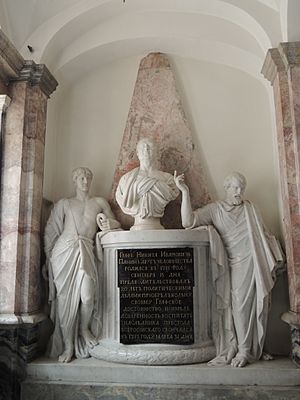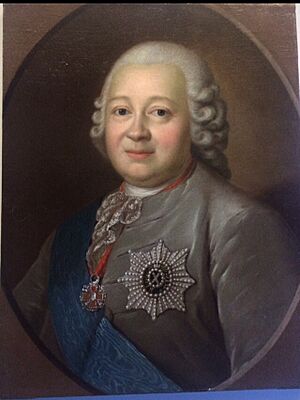Nikita Panin facts for kids
Count Nikita Ivanovich Panin (born September 29, 1718 – died April 11, 1783) was an important Russian leader. He was a key advisor to Catherine the Great for the first 18 years of her rule (1762–1780). Panin believed in strong friendships between Russia and other countries, especially Prussia. He also wanted to create a special group of advisors for the empress. He was against dividing up Poland, which eventually led to him being replaced by another advisor, Prince Bezborodko. Catherine the Great often chose people from Panin's powerful family to work in the government.
Contents
Early Life and Career
Nikita Ivanovich Panin was born in Danzig (now Gdańsk, Poland). His father was a Russian commander in Pärnu, Estonia, where Nikita spent most of his childhood. In 1740, he joined the Russian army.
Panin later became a diplomat, representing Russia in other countries. In 1747, he worked in Copenhagen, Denmark. A few months later, he moved to Stockholm, Sweden. For the next 12 years, he was a main opponent of the French influence in Sweden. While living in Sweden, Panin became interested in the idea of governments with a constitution, which limits the ruler's power.
In 1760, Panin was chosen for a very important role: he became the teacher and guardian of the young Grand Duke Paul, who would later become emperor. This job made Panin very influential in the Russian court.
Working with Catherine the Great
Panin supported Catherine when she became empress in 1762, taking the throne from her husband, Tsar Peter III. Panin suggested creating a special council of six or eight ministers. This council would handle all government business. However, Catherine thought this was a way to limit her power, so she did not agree.
Even so, Panin remained very important. This was partly because he was Grand Duke Paul's tutor, and Paul was very fond of him. Panin also had a deep understanding of foreign affairs. He acted as the minister of foreign affairs, guiding Russia's relationships with other countries.
The Northern Accord
Panin came up with a famous idea called the "Northern Accord." He wanted to create a strong alliance between Russia, Prussia, Poland, Sweden, and possibly Great Britain. This group would stand against the alliance of France and Austria.
This plan was difficult to achieve because these countries had different goals. For example, Great Britain did not always see eye-to-eye with Russia on supporting anti-French groups in Sweden. Even though the Northern Accord was never fully formed, it greatly influenced Russia's foreign policy for many years.
Panin's plan also explains why he was careful with Poland. He saw Poland as a necessary part of his alliance. He hoped Poland would replace Austria, which was not allied with Russia at the time. All major diplomatic decisions in Russia from 1762 to 1783 were closely linked to Panin's ideas. His influence began to lessen when it became clear that the Northern Accord, which cost Russia a lot of money, would not fully happen.
Decline of Influence

After 1772, when the king of Sweden, Gustav III, changed his country's policy, Panin focused on a strong alliance between Russia and Prussia. His ideas about Poland were different from those of Frederick the Great of Prussia and Catherine. Panin wanted Poland to remain whole and strong, under Russia's influence, after he helped place Stanislaus II on the Polish throne.
However, Russia's involvement in Poland's internal affairs caused problems. The Confederation of Bar (a Polish rebellion) and the Russo-Turkish War surprised Panin and weakened his position. He had to agree to the first partition of Poland, where parts of Poland were divided among Russia, Prussia, and Austria.
Panin further upset Catherine by getting involved in the marriage plans of Grand Duke Paul. He also continued to push for a closer alliance with Prussia, while Catherine was starting to prefer Austria. Despite this, Panin kept his strong influence over Paul, who also admired the King of Prussia.
As Austria's influence grew, Panin found a new opponent in Joseph II of Austria. Panin tried to prevent a marriage alliance between the Russian and Austrian royal families. This made Catherine want to remove him from power. The reasons for his dismissal are complex. It seems the final disagreement was about a policy called "armed neutrality" for the North. Other powerful figures, like Grigori Aleksandrovich Potemkin and the English ambassador James Harris, had also been working against him. In May 1781, Panin was dismissed from his duties. He died two years later in 1783.
Personal Qualities
Panin was known as one of the most educated, skilled, and polite Russians of his time. Catherine the Great even called him her "encyclopedia" because of his vast knowledge. He was also known for being kind and fair. He enjoyed a comfortable lifestyle and was known for having the best cook in the capital. Although he never married, he was attracted to women.
See also
 In Spanish: Nikita Ivánovich Panin para niños
In Spanish: Nikita Ivánovich Panin para niños
 | William L. Dawson |
 | W. E. B. Du Bois |
 | Harry Belafonte |



